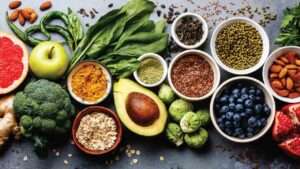Comprehensive diet for Vata, Pitta & Kapha: why and what to eat as per your natural body constitution
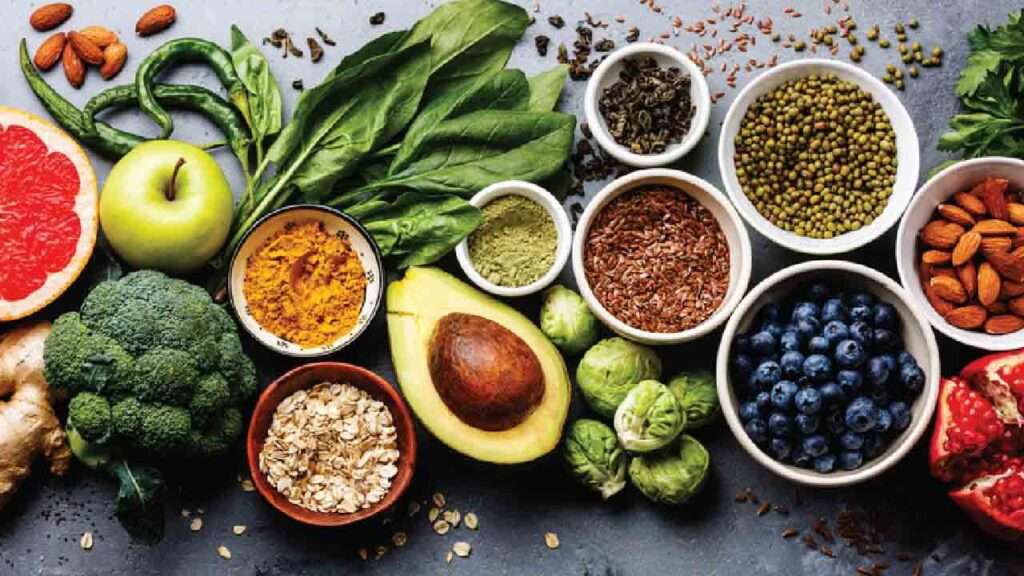
What happens when you plant a seed or a sapling in a barren land? The seed does not grow and the sapling wilts because of the absence of nourishment. Similar is the case with us. Without a nutritious and appropriate diet, we tend to become unhealthy and weak.
“Let food be thy medicine”
– Hippocrates
The food you eat eventually reaches each cell of your body. It provides your cells with the energy for functioning. The food you eat is also responsible for your body’s growth and development. It is required to maintain the following functions for survival: metabolism, immunity, cognition, movement, etc. Hence, you should be conscious while choosing the food to eat. A healthy diet for Vata, Pitta and Kapha will always keep you fit and less prone to diseases.
One of the aspects of the Ayurvedic principle of preventing and curing diseases is based on diet. As per Ayurveda, Ahara or diet determines the health of an individual. Acharya Charaka considered food responsible for disease or health.
Healthy Diet Plan As Per Ayurveda
Ayurveda recommends choosing food as per its qualities (gunas), the potential energy of foods (Virya – cooling or heating effect), the post-digestive effect of taste (Vipaka) and the specific action of food (Prabhava). This principle is also applied to prescribing not only foods but also medicines.
Foods may pacify or aggravate the three doshas in your body. Hence, your everyday diet can act as a medicine to treat diseases and keep you healthy.
Two fundamental principles in Ayurveda are “like increases like” and “opposites create balance.” Foods with qualities that are similar to the qualities of a dosha will increase that specific dosha. On the other hand, foods with qualities opposite to the qualities of a dosha will decrease that specific dosha.
The warm, moist, sweet, sour and heavy qualities or gunas balance the Vata dosha. The gunas or qualities that balance Pitta are cool, sweet, heavy, bitter, astringent, and dry. Pungent, bitter, astringent, light, warm and dry qualities or gunas balance Kapha.
Hence, you can design your diet to increase or decrease the levels of three doshas in your body. In this way, you can restore your natural constitution. The recommended diet for each dosha type is as follows:
Vata Dosha
Vata-pacifying best diet plan includes fruits like mangoes, apricots, grapes, bananas, berries, oranges, plums and pineapple. If you are a Vata person, you can eat cooked vegetables, asparagus, beets, garlic, green beans, potatoes (sweet), radishes, carrots, cucumbers. Your diet should include oats, mung beans, rice, lentils and wheat. All dry fruits in small quantities, all spices, dairy in moderate amounts, all oils and seeds are healthy for you to eat.
Vata individuals should stay away from dried fruits, apples, cranberries, pears, pomegranate, watermelon. Raw vegetables, broccoli, spinach, sprouts, brussels sprouts, cabbage, potatoes, tomatoes, cauliflower aggravate Vata. Barley, corn, millet, legumes and white sugar should be avoided.
Pitta Dosha
Sweet fruits like apples, mangoes, melons and dark grapes should be preferred by pitta individuals. You may eat fruits like pears, plums, raisins, and pomegranates if pitta is dominant in you. You should eat sprouts, cabbage, asparagus, leafy greens, cucumber, and other bitter vegetables. Your diet should include cooked oats, wheat, white rice, all legumes except lentils and coconut. Seeds except sunflower and pumpkin should be avoided. Cottage cheese, milk, and ghee should be consumed. Olive, coconut, sunflower, and soy oil are good for pitta individuals.
Sour fruits like lemons, pineapples, oranges, green grapes, bananas, cherries, cranberries, papaya, peaches, plums should be avoided. You should exclude onions, radish, spinach, pungent vegetables, beets, tomatoes, carrots, eggplant, garlic from your diet. Corn, millet, brown rice, lentils, dry fruits, and all spices (except turmeric, coriander, cinnamon, cardamom) aggravate pitta. Pitta individuals should stay away from yogurt, buttermilk, and cheese. Sesame, almond, and corn oil should be avoided.
Kapha Dosha
The best diet plan for Kapha individuals should include apples, mangoes, peaches, apricots, berries, cherries, cranberries, pears, pomegranate, and raisins. You should prefer to eat pungent & bitter vegetables, leafy greens, asparagus, beets, cabbage, carrots, sprouts, spinach, cauliflower, celery, ladyfinger, parsley, peas, peppers, potatoes (white), radishes if Kapha dosha is dominant in you. Corn, barley, millet, oats, and a small amount of Basmati rice can be included in your diet. All legumes (except as listed below), dry fruits, honey, all condiments are Kapha pacifying. Dairy products like ghee, goat milk, and almond, corn, sunflower oil (all in moderation) balance Kapha dosha.
Fruits like avocado, coconut, lemons, melons, oranges, papaya, bananas, pineapple, grapes, plums aggravate Kapha. Sweet & juicy vegetables, sweet potatoes, cucumber, and tomatoes should not be a part of your diet if you have dominant Kapha. You should avoid brown and white rice and wheat. Grains like kidney beans, soybeans, black lentils that are difficult to digest should be avoided. All other seeds except sunflower, pumpkin are Kapha-aggravating. You should stay away from salt, dairy products, and some oils like avocado oil, sesame oil, coconut oil, olive oil and apricot oil.
Vata, Pitta, Kapha Diet Chart
Pitta diet chart
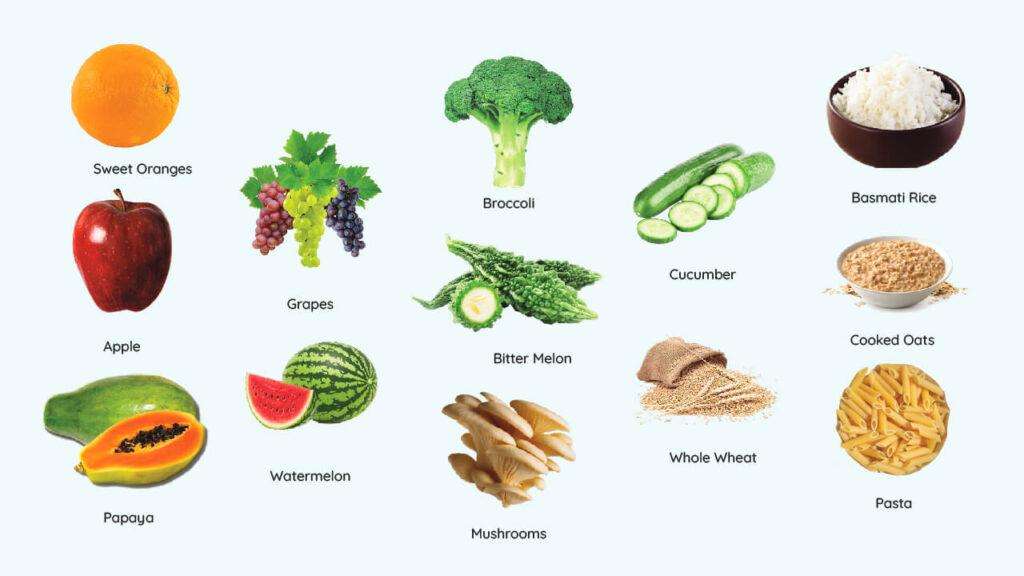
Kapha diet chart
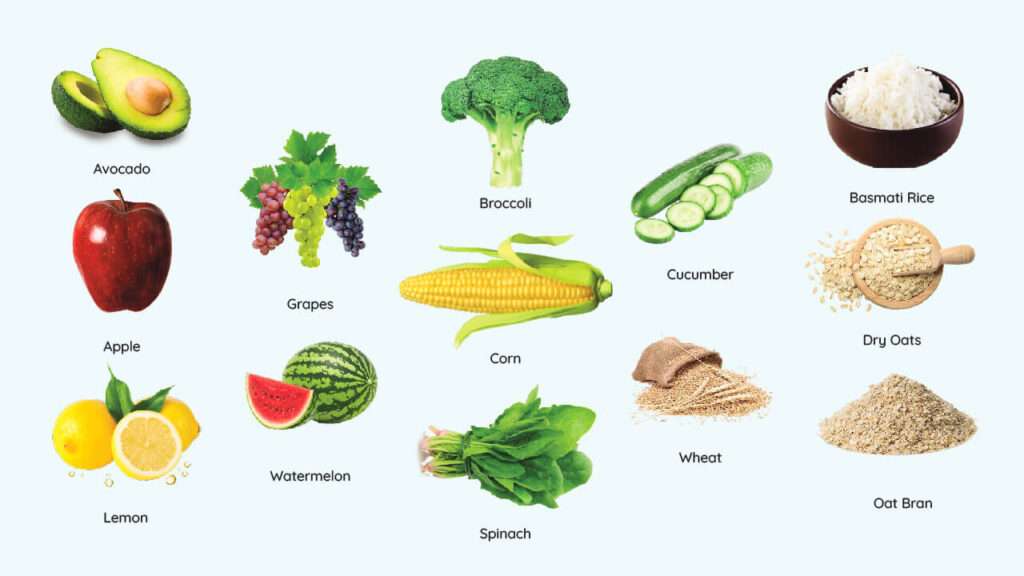
Vata diet chart
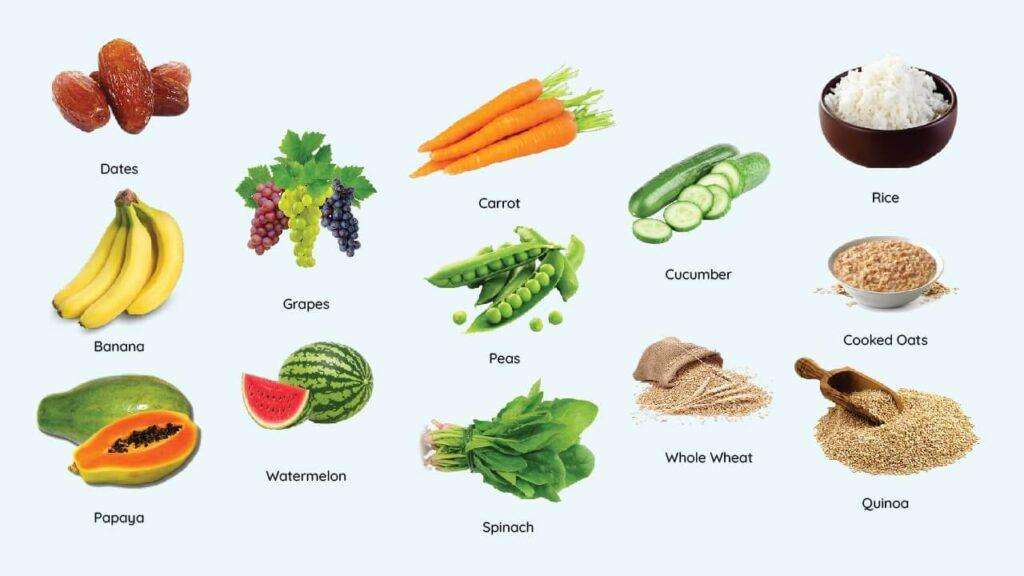
Finally…
Functional medicine is a sub-branch of modern medicine that focuses on identifying the root cause of a disease. Scientists have discovered that food can be one of the factors playing a role in body dysfunction leading to conditions like diabetes, obesity or cancer.
Poor dietary regimes affect your health tremendously. It may make you obese, weak, less immune to infections, etc. Most importantly, food undeviatingly affects your mental health.
As a result, functional medicine now considers using food as an instrument to:
- treat impaired functions of your body
- or at least reduce the risk of contracting a disease
Ayurveda has a similar approach to preventing and treating diseases. It suggests a unique diet for every individual based on his or her dosha constitution. Moreover, Ayurveda treatment alters the diet of patients to overcome a disease or improve poor health more effectively. Hence, eating as per the doshas keeps your body in resonance with your natural constitution or Prakriti.
FAQs
Can you be vata pitta and kapha?
Yes, it means that there is not a single dominant dosha in your body, all three are in harmony. You have a balanced Prakriti if you have vata-pitta-kapha constitution/personality. Most people fall into dual dosha prakriti and vata-pitta-kapha is rare.
How do you control vata pitta and kapha?
You try to pacify the aggravated dosha in your body by eating and doing dosha pacifying food and activities respectively. For example, if you have dry skin and are very thin your Vata is aggravated and Kapha is inactive. You should avoid dry and gassy foods and eat heavy and moist foods like ghee, dairy products, nuts, etc. Take time to learn about your body and then only can you guess what kind of dosha is aggravated in you and which ones need to be made active. Taking help from an experienced Ayurveda practitioner is recommended.
How do I know if I am vata pitta or kapha?
If you are vata-pitta-kapha, then you have all doshas in an equal amount present in your body. This will result in balanced physical and mental health. you are free from disease almost in equilibrium, but this is very rare.

